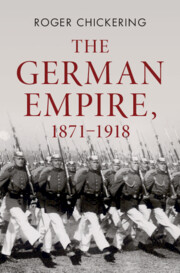Refine search
Actions for selected content:
59 results
2 - The Politics of Emergency in Action
-
- Book:
- Latin America and Human Rights Politics in West Germany, 1973–1990
- Published online:
- 18 October 2025
- Print publication:
- 18 September 2025, pp 69-111
-
- Chapter
- Export citation
4 - Quiet Diplomacy
-
- Book:
- Latin America and Human Rights Politics in West Germany, 1973–1990
- Published online:
- 18 October 2025
- Print publication:
- 18 September 2025, pp 145-182
-
- Chapter
- Export citation
7 - The Politics of Market-Friendly Democratization
-
- Book:
- Latin America and Human Rights Politics in West Germany, 1973–1990
- Published online:
- 18 October 2025
- Print publication:
- 18 September 2025, pp 264-304
-
- Chapter
- Export citation
6 - A Jurist in Search of Good Government
-
- Book:
- Neil MacCormick
- Published online:
- 22 May 2025
- Print publication:
- 12 June 2025, pp 242-300
-
- Chapter
- Export citation
Chapter 2 - The Power of the State
-
- Book:
- The Quest for Individual Freedom
- Published online:
- 12 April 2025
- Print publication:
- 10 April 2025, pp 56-99
-
- Chapter
- Export citation
How Do Social Democrats Legitimize Cutbacks? Welfare Retrenchment to Save the Welfare State
-
- Journal:
- Government and Opposition / Volume 60 / Issue 3 / July 2025
- Published online by Cambridge University Press:
- 13 March 2025, pp. 664-681
-
- Article
-
- You have access
- Open access
- HTML
- Export citation
12 - The Ends of Social Democracy
- from IV - 1931–76: Society Triumphant
-
- Book:
- Modern Britain, 1750 to the Present
- Published online:
- 14 January 2025
- Print publication:
- 30 January 2025, pp 435-480
-
- Chapter
- Export citation
10 - Late Imperialism and Social Democracy
- from IV - 1931–76: Society Triumphant
-
- Book:
- Modern Britain, 1750 to the Present
- Published online:
- 14 January 2025
- Print publication:
- 30 January 2025, pp 351-395
-
- Chapter
- Export citation
The two grand movements of socialism and their dialectics: A global Retrospect – CORRIGENDUM
-
- Journal:
- International Labor and Working-Class History / Volume 106 / October 2024
- Published online by Cambridge University Press:
- 23 December 2024, p. 476
-
- Article
-
- You have access
- Open access
- HTML
- Export citation

The German Empire, 1871–1918
-
- Published online:
- 06 December 2024
- Print publication:
- 02 January 2025
7 - Achievements and Unacknowledged Dangers
- from Part III - Living in Germany: 1870–1930
-
- Book:
- Germany through Jewish Eyes
- Published online:
- 14 November 2024
- Print publication:
- 21 November 2024, pp 111-130
-
- Chapter
- Export citation
The two grand movements of socialism and their dialectics: A global Retrospect
-
- Journal:
- International Labor and Working-Class History / Volume 106 / October 2024
- Published online by Cambridge University Press:
- 07 November 2024, pp. 357-364
-
- Article
-
- You have access
- Open access
- HTML
- Export citation
Kautsky’s Unexpected Comeback: Understanding the Re-emergence of the Second International in Contemporary Debates
-
- Journal:
- International Labor and Working-Class History / Volume 106 / October 2024
- Published online by Cambridge University Press:
- 19 September 2024, pp. 414-425
-
- Article
-
- You have access
- Open access
- HTML
- Export citation
5 - Swedish Social Democracy and Weimar
-
-
- Book:
- Weimar's Long Shadow
- Published online:
- 26 September 2024
- Print publication:
- 27 June 2024, pp 119-144
-
- Chapter
- Export citation
The West German and Italian Left in the “Two Cultures” Debate: Trasnationalization and Localization (1964–1969)
-
- Journal:
- Central European History / Volume 57 / Issue 3 / September 2024
- Published online by Cambridge University Press:
- 01 April 2024, pp. 377-398
- Print publication:
- September 2024
-
- Article
-
- You have access
- Open access
- HTML
- Export citation
Sergei Chakhotin against the Swastika: Mass Psychology and Scientific Organization in the Iron Front's Three Arrows Campaign
-
- Journal:
- Central European History / Volume 57 / Issue 4 / December 2024
- Published online by Cambridge University Press:
- 18 March 2024, pp. 479-498
- Print publication:
- December 2024
-
- Article
- Export citation
2 - Social Justice within a Market Society
-
-
- Book:
- Social Justice in Twentieth-Century Europe
- Published online:
- 29 February 2024
- Print publication:
- 07 March 2024, pp 30-52
-
- Chapter
- Export citation
A New Dilemma of Social Democracy? The British Labour Party, the White Working Class and Ethnic Minority Representation
-
- Journal:
- British Journal of Political Science / Volume 54 / Issue 3 / July 2024
- Published online by Cambridge University Press:
- 15 December 2023, pp. 793-815
-
- Article
-
- You have access
- Open access
- HTML
- Export citation
7 - Peacemaking as a Progressive Grand Strategy
-
- Book:
- Grand Strategies of the Left
- Published online:
- 19 October 2023
- Print publication:
- 02 November 2023, pp 128-152
-
- Chapter
- Export citation
4 - Rawls’s Principles of Justice as a Transcendence of Class Warfare
- from Part I - Rawls and History
-
-
- Book:
- Rawls’s <i>A Theory of Justice</i> at 50
- Published online:
- 20 July 2023
- Print publication:
- 10 August 2023, pp 78-94
-
- Chapter
- Export citation
